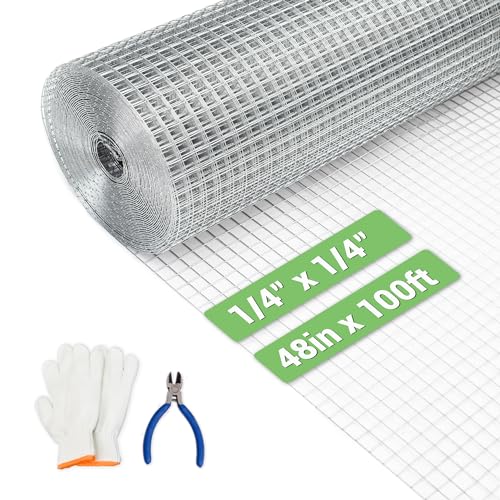
When setting up a chicken coop, the security of chickens hinges on the materials chosen for their enclosure. Like many, you may find yourself weighing the merits of chicken wire against hardware cloth. The comparison is worthwhile since the two are commonly used yet differ significantly.
Chicken wire is often the go-to material for new chicken coop builders. Its hexagonal pattern characterizes it, and it is usually made from thin, flexible galvanized steel or PVC-coated wire.
While it’s inexpensive and great for keeping chickens in, its primary drawback is its strength, especially when deterring predators.
Hardware cloth, on the other hand, is a sturdier option. Unlike chicken wire’s hexagonal openings, it has a square or rectangular grid pattern and is made from thicker, welded wire.
This robust construction is what gives hardware cloth its edge in security. It can be a critical deciding factor in keeping predators out.
Both materials are typically made from galvanized steel, which provides a degree of rust resistance. However, details like mesh sizes and weave types can differ.
Fine mesh sizes are excellent for smaller pests, and the strength of the weave can withstand the more determined invader. Each of these factors plays an essential role in the safety and longevity of the coop’s structure.
Your choice concerns safeguarding against the ever-present threat of predators and providing a safe environment for your chickens.
Before you decide, consider the potential risks in your area (such as what predators you have) and the durability you expect from your investment. These considerations will impact your flock’s well-being and the coop’s lasting quality.
Analyzing the Security Features of Chicken Wire Vs. Hardware Cloth
Picture your coop tucked safely on your property. Now, consider the following question: What determines the security level of your materials? If you’re weighing chicken wire against hardware cloth for your coop, mesh size and strength can’t be overlooked.
Chicken wire typically features larger hexagonal openings, which may be fine for keeping chickens contained but could invite smaller predators, such as snakes or rats, opportunities for intrusion.
A fundamental aspect to consider is the material’s resistance to animal damage. Predators can be persistent when they spot a potential meal. Hardware cloth often provides a sturdier barrier with its smaller, square openings. It’s less likely to give way under the assault of sharp claws or teeth, whereas chicken wire may be more easily compromised.
The smaller mesh of the hardware cloth makes it much more difficult for a fox or a raccoon to get its teeth inside the openings to chew through the fencing, while the greater strength of the cloth makes pawing through it almost impossible. There is no stopping a bear short of a fortress, so they’re not part of this conversation.
When considering protecting your flock, the effectiveness against predator invasions can’t be stressed enough. The thing is, you never really have a problem until you do. Let me explain.
You can go weeks or months without a single predator issue, but once a fox, raccoon, weasel, or mink finds your coop. The battle is on. And winning is a matter of life and death for your chickens.
Author
Furthermore, it’s not just an attack on your chickens that does damage. When the chickens know they are in danger, they become very stressed. What does stress mean? Less or no eggs. Did you know that a chicken can literally be scared to death? Whew! What a disaster.
Wildlife, such as raccoons, known for their dexterous paws, can manipulate chicken wire but may struggle to overcome hardware cloth. Imagine the peace of mind knowing that your defenses are robust.
Weather can be unforgiving, and buying materials that stand up to the elements is essential.
Both chicken wire and hardware cloth typically come in galvanized steel, a protective coating that resists rust. However, the heavier gauge of hardware cloth can offer added assurance against the decay that exposure to the elements can bring.
Finally, consider the longevity of these materials. Investing in a solution that may initially cost more but promises an extended lifespan can lead to savings.
Hardware cloth generally wins in this aspect, often maintaining its integrity for longer periods than chicken wire, which could sag or warp over time.
Making the Right Choice for Your Coop
I understand the importance of picking the right material for your chickens’ safety. When you’re weighing your options between chicken wire and hardware cloth, your decision should pivot on the specific needs of your coop.
-
 $125.99Buy Now
$125.99Buy Now1/4 x 1/4 galvanized mesh wire can be used to build wire walls and roofs for chickens to ensure their safety and keep out snakes, squirrels, eagles, foxes, raccoons, etc. This mesh roll can also protect your young plants from rodent animals! Providing long-lasting protection for your vegetable gardens.
We earn a commission if you make a purchase, at no additional cost to you.
07/26/2024 07:38 am GMT -
 $94.99Buy Now
$94.99Buy NowTHE RIGHT PROTECTION - Whether you want to keep your garden flower bed, vegetable, grape vines, farm field, and landscape safe from animals like cats, dogs, gophers, and goats as a repeller, keep chickens from getting out, or simply make a protective fence or enclosures, around the house, our rust-resistant garden fencing wire has you covered.
We earn a commission if you make a purchase, at no additional cost to you.
07/26/2024 10:09 am GMT
In other words, some situations call for hardware cloth, while others call for chicken wire. Another solution is to put hardware cloth on the ground level and chicken wire up top. Each situation requires careful thought.
Are you trying to keep chickens out of the garden? Chicken wire is the answer. Are you trying to protect the run from an invading fox? Hardware cloth will get the job done.
Think about the predators native to your area. Smaller mesh sizes are a MUST for keeping out those sneaky, smaller critters.
Cost can be a significant factor in your decision. Hardware cloth tends to be pricier upfront, but consider this: the long-term durability might offset the initial expense. Saving a few dollars today should never compromise the safety of your flock tomorrow.
One aspect you might not consider is the ease of installation. Chicken wire is more malleable and easier to shape and apply, but remember that its lower resistance to damage might call for more frequent replacements.
Hardware cloth is tougher and more rigid, which could make it a bit more challenging to work with, but this is a one-time deal in many cases.
Simple maintenance steps can greatly extend the life of whichever material you choose. Regular inspections for any signs of rust, damage, or wear and tear will go a long way.
Look for gaps or tears regularly and repair them promptly to avoid giving opportunistic predators an easy access point.
In conclusion, considering the expert advice and the insights you’ve gained, hardware cloth generally offers superior protection and longevity. It is the RIGHT CHOICE for peace of mind and robust coop security. But every situation is unique. Make your choice carefully about the particular challenges you face, balancing costs, labor, and, most importantly, the safety and well-being of your feathered friends.
Dave

Chickenmethod.com


